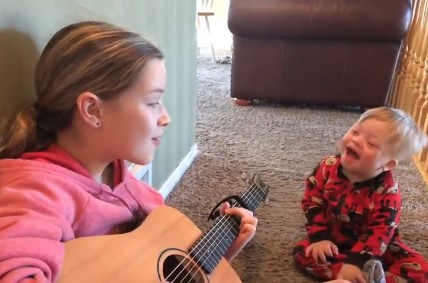
There's absolutely no shortage of some study or another raving about the amazing impact music has on everything from development, to learning, to mood.
Regardless of whether baby, toddler, teen or adult, the power of music to infiltrate and move a listener is undeniable.
For mom Amanda Bowman Gray music has had more than a profound effect, it’s helped her 2-year-old learn to speak.
In a Facebook post, Amanda shared a beautiful moment between her son and daughter, Bo and Lydia; revealing that the little guy, who has Down syndrome, has made tremendous progress due to singing and music.
His 12-word vocabulary is mostly thanks to his family's musical talents.
Watch:
Let's give a moment to the sister's guitar skills!
The video has received more than 50 million views so far, and highlights the amazing possibilities of music therapy.
Parent24 spoke to registered music therapist, Caley Garden to find out more about the benefits of this unique form of therapy.
Also see: This song makes baby happy!
What is music therapy?
Caley: Music therapy is an established health profession that can only be done by an HPCSA registered therapist with a Master’s qualification.
Music therapists deliver music-based experiences to people of all ages within a client-therapist relationship to improve the health, functioning and well-being of our clients. Our goals may be similar to those of other therapists (psychological, emotional, cognitive, physical, communicative or social), but the important difference is that the tool of the therapy is music.
What kind of techniques are used?
Caley: A music therapist designs unique musical experiences to address an individual client's needs and goals. Sessions will therefore look different with each client and may be structured as a group or one on one session.
It will include a lot of music making. We may play percussion instruments, sing, listen to music, move to music, improvise new music, write songs or relax to music. There is no pressure to ‘perform’ or ‘get it right’. These interventions offer opportunities for emotional expression and the strengthening of abilities to be transferred to other areas of one’s life.
Music provides new avenues of expression for those who find it difficult to express themselves in words.
- Also see: Music and your baby
When should parents consider music therapy for their child?
Caley: Music therapy can be of benefit to anyone of any age and any culture. You DO NOT have to have any musical experience or training to take part in music therapy.
Music therapy can be especially beneficial for children with behaviour difficulties such as aggression, shyness, withdrawal, excessive tantrums or lack of impulse control.
It can also have positive results for individuals with special needs or communication challenges such as Autism Spectrum Disorder, Down syndrome, Cerebral Palsy and other mental or physical handicaps. Music has huge potential to nurture any child’s development, no matter their age or ability.
- Also see: Mozart magic and the developing brain
Why is music therapy so beneficial for people with Down syndrome and other cognitive difficulties?
Caley: Music is known to activate all parts of the brain and therefore has the potential to help children with cognitive difficulties in all areas of their development. Speech is naturally musical in that it has meter, rhythm and melodic contour.
Music therapy can aid language and communication development in children who struggle in this area. Music can provide motivation to tackle tasks that children find challenging.
Children with Down syndrome often have a passion for music and performing and music therapy can offer them opportunities to nurture their talents while learning healthy social skills in a safe, accepting environment. Music therapy can even aid motor skills by using rhythm and time to cues. Lastly, participation in music therapy offers opportunities for intrapersonal growth, such as sense of agency, increased self-esteem, a positive self-image and self-confidence.
Have you tried music therapy for your child? What was the outcome? Tell us your story by emailing to chatback@parent24.com and we could publish your letter. Do let us know if you'd like to stay anonymous.
Read more:
- Exposing your baby to music really can produce a genius
- Top music education apps to help your kid to tune in
- Music for your premmie?
Sign up for our weekly newsletter to receive Parent24 stories directly to your inbox.




 Publications
Publications
 Partners
Partners














